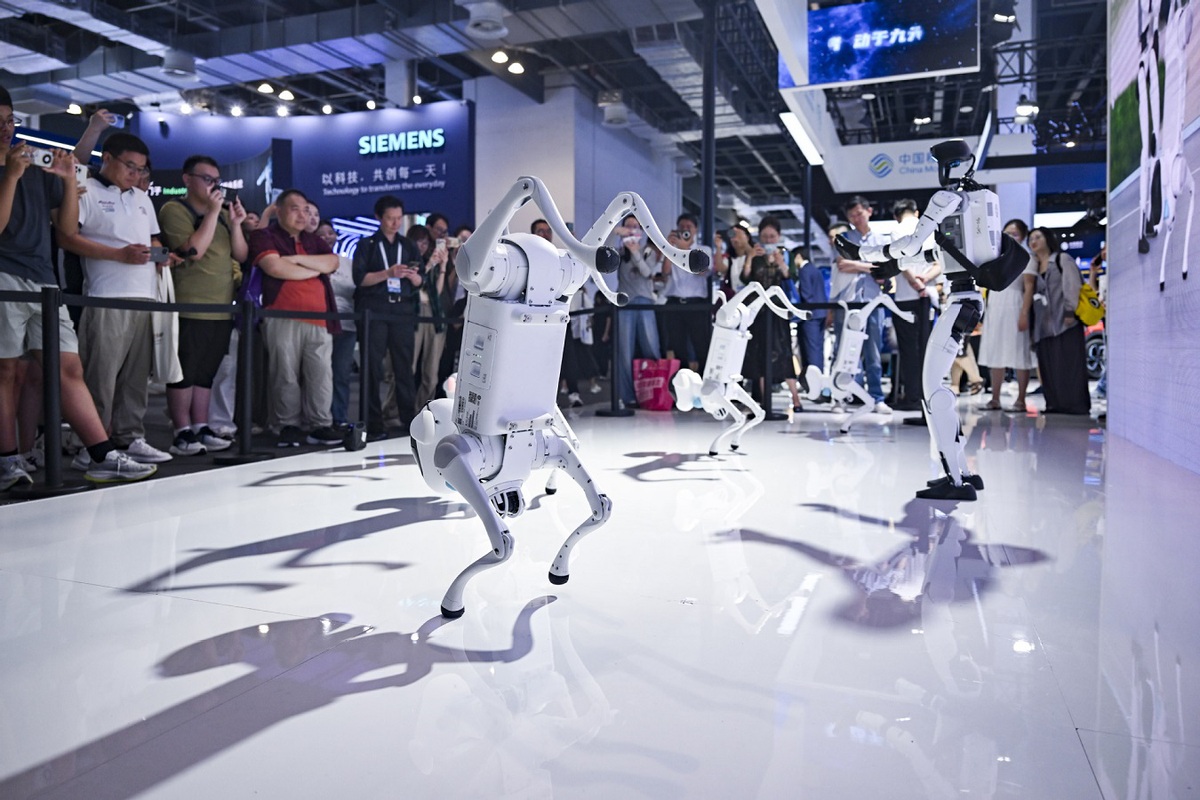Ecosystem envisioned for AI robotics


As up-to-date embodied intelligence technologies and products debuted at the 2025 World Artificial Intelligence Conference and High-Level Meeting on Global AI Governance in Shanghai, experts and industry insiders said that substantial development of the industry depends on the creation of an amiable industrial ecosystem.
During the three-day conference, which opened on Saturday, Hangzhou-based Deep Robotics debuted its industry-level quadruped robot, which can conduct full-process power inspections. It can accurately identify inspection targets, such as power system pointer gauges and infrared temperature, and autonomously assess battery level and charge, achieving uninterrupted operation without human involvement.
Shenzhen Xborg Robotics showcased a heavy-duty robot, the first of its kind in China, that can lift 20 kilograms with one arm, while its own weight has been reduced by 62.5 percent by using aerospace-grade technology. More than 90 percent of its parts are domestically developed, with a failure rate lower than 0.1 percent.
Dalian Betop Culture Technology, a leading high-tech cultural tourism enterprise, attended the conference for the first time this year, showcasing its "AI super agent". The learning-capable robot, which features a giant body, facial expressions and multimodal interaction, can support an entertainment ecosystem that seamlessly blends virtual and real experiences.
According to company founder Xiao Di, once-abandoned industrial parks can evolve into new tourist attractions by using this interactive AI technology, addressing China's urban renewal initiatives.
Shanghai-based Keenon Robotics released the latest model of its bipedal humanoid service robot. The robot can be used in restaurants and hotels and is capable of preparing and serving meals, as well as cleaning rooms, and can reduce human labor costs by more than 50 percent.
Keenon CEO Li Tong said that China now shows a large competitive edge in terms of the development of service-type humanoid robots. This is closely related to China's highly efficient supply chain, experiences in algorithm innovation and data collection, as well as the rich supply of local engineers, Li said.
He pointed out that the market share of the robot industry is still relatively small in China, and said more companies should be part of the market to improve the industry penetration rate and stimulate demand.
Agreements were signed on Saturday between companies and the National and Local Co-Built Humanoid Robotics Innovation Center in Shanghai, aiming to create a training cooperation ecosystem.
According to Jiang Lei, the center's chief scientist, enabling humanoid robots to work will be the major trend in the next decade, so collecting data from various training grounds is crucial.
Experts from China International Capital Corp said that most humanoid robot orders now come from universities or large manufacturing companies, with the purpose of conducting experiments.
However, they said, industries incurring higher labor costs will be ready to introduce humanoid robots by 2030, when the robotics penetration rate is expected to have reached 50 percent among the information technology, equipment production and logistics industries. The penetration rate in residential services, hotels and restaurants is expected to rise steadily after 2035.
Du Guangda, deputy head of the science and technology department of the Ministry of Industry and Information Technology, said that creating a sound ecosystem is inseparable from the introduction of industry and safety standards, deepened cooperation between cities, and continued financing.
Therefore, Pudong New Area in Shanghai launched on Sunday a 2 billion yuan ($279 million) State-backed AI seed fund, with initial funding coming in at 500 million yuan. The fund, which aims to facilitate the development of frontier technologies and attract industry talent, will help startups to survive during their early days. This will encourage more startups, boost entrepreneurship and help to create an industrial ecosystem, said Pudong government officials.
Joined by seven Chinese universities and two research institutes, the National and Local Co-Built Humanoid Robotics Innovation Center also released on Saturday an open fund to nurture AI development, although the amount was not disclosed.
Defining humanoid robots as the best representation of embodied intelligence, Xu Xiaolan, chair of the Chinese Institute of Electronics, said that such robots will become the next disruptive products for household, production, warehouse, logistics and border defense uses. Humanoid robots can also boost development along the industrial chain including in chips, sensors and new materials, Xu added.
According to a report released during an industry conference in April, China's embodied intelligence industry will see its market value approaching 5.3 billion yuan by the end of this year, accounting for 27 percent of the world's total.






























